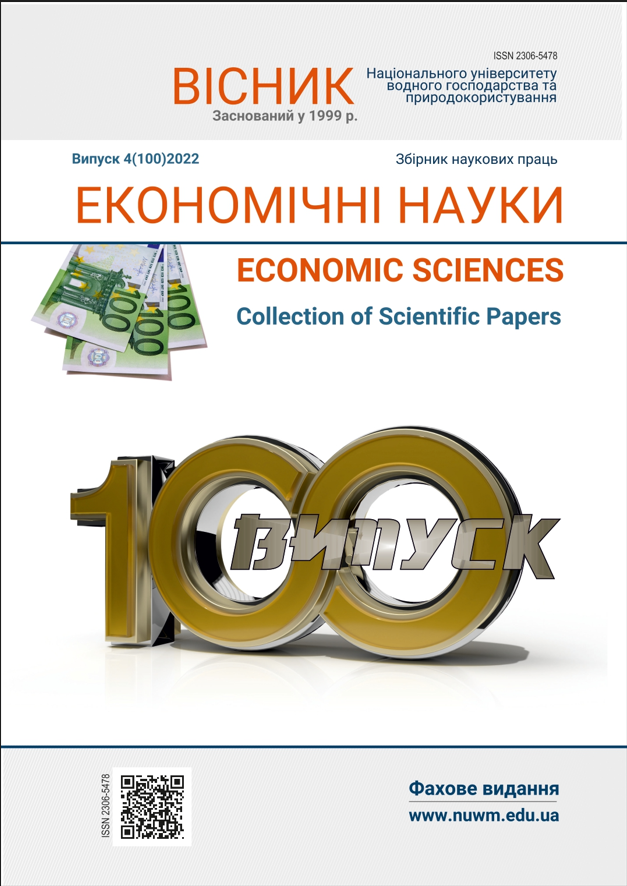INTEGRATED REPORTING: FUNCTIONAL PURPOSE AND ITS EFFICIENCY CRITERIA
DOI:
https://doi.org/10.31713/ve420227Keywords:
integrated reporting, domestic entities, balanced economic activity, economic potential, international reporting standards.Abstract
The article examines the role of the integrated reporting model as a tool for complete information obtaining about management in modern conditions. The priority prerequisites for the existing practice usefulness for forming integrated reporting have been identified, taking into account the enterprise need to fully assessment disclose of economic potential through the complex application of both financial and non-financial indicators. It is noted that risks for Ukrainians have significantly increased in war conditions, many of enterprises have already suffered direct material losses. The report on management, the preparation of which is provided for by the Ukraine legislation for joint-stock companies, has a value that needs for better today. It is justified that, taking into account fourth generation of the GRI 4.0 Guide requirements, integrated reporting should disclose essential aspects in terms of economic, environmental and social components.Main differences between integrated and financial reporting, integrated reporting advantages, such as: a high transparency level and data objectivity, additional information availability on the environmental and social activities of the enterprise, active management accounting use, are given. The usefulness of integrated reporting for domestic enterprises in martial law conditions is substantiated through the publication of such financial and non-financial indicators as: activity, results and prospects for the enterprise development in relation to the state; the operational activities impact on the environment, adaptation disclosure to globalization processes, integration into world markets; provision of production ecologically for clean resources; the intensification impact of migration flows and disparities in demographic and economic development, etc.In accordance with the international concept of the Balanced Scorecard (BSC), a group of non-financial indicators, that can be effectively applied today by enterprises of Ukraine, is given. The integrated reporting effectiveness is revealed due to its ability for reflect the activities, results and prospects of the enterprise’s development in relation to a modern external social and economic trends number, including the increase in the population number, its aging, scarcity of resources, the increase in the environmental pollution level, the outflow of talented young people beyond border, ethnic and national conflicts, etc. By measuring a variables number and focusing on long-term, financial stability, integrated reporting ensures that enterprises are ready for a sustainable future. A non-financial report is one of the ways in order to communicate with staff, so today it should include asocial guarantees list for employees. It is important for the company to show that the management has de-russified the suppliers list and partners. A non-financial report may contain goals for the next period, so it is necessary to outline specific areas that require investments. In information war conditions it is necessary to distribute reliable information, and the report according to international standards GRI is considered a reliable source. Therefore, approaches to reporting in accordance with GRI international standards are recommended in the work will allow domestic enterprises to quickly and fully resource security assess of business activities, determine management strategies for the financial support for both development and planning of enterprises activity.References
Романенко О. А., Комірна О. В. Аналіз інтегрованої звітності у забезпечені сталого розвитку суспільства. URL: http://global-national.in.ua/archive/17-2017/177.pdf (дата звернення: 09.11.2022).
Левицька С. О., Кучер Ю. В. Роль інтегрованої звітності в розкритті суспільної корисності бізнесу. Вісник Національного університету водного господарства та природокористування. Сер. Економічні науки. 2020. Вип. 4(92). С. 152–165. URL: https://doi.org/10.31713/ve4202015 (дата звернення: 10.10.2022).
Тлучкевич Н. В. Інтегрована звітність – нова модель облікової системи. URL: https://conf.ztu.edu.ua/wp-content/uploads/2019/11/181-1.pdf (дата звернення: 14.10.2022).
Драгер Х. Інтерв’ю. URL: http://www.csrjournal.com/interview/5666-
integrirovannaya-otchetnostvozmozhnost-dlyarossiyskih-kompaniy-naverstatupuschennoe-v-oblastikorporativnoy-otchetnosti.html (дата звернення: 18.11.2022).
Eccles R. G., Michael P. Krzus. One report: integrated reporting for a sustainable strategy. John Wiley & Sons, 2010. 240 p.
Томчук В. В. Інтегрована звітність: новий етап у еволюції бухгалтерського обліку. URL: file:///C:/Users/Acer/Downloads/5026-
%D0%A2%D0%B5%D0%BA%D1%81%D1%82%20%D1%81%D1%82%D0%B0%D1%82%D1%82%D1%96-10096-1-10-20180212.pdf (дата звернення: 18.11.2022).
Романенко О. А., Комірна О. В. Аналіз інтегрованої звітності у забезпечені сталого розвитку суспільства. URL: http://global-national.in.ua/archive/17-2017/177.pdf (дата звернення: 15.10.2022).
Левицька С. О. Осадча О. О. Оцінка економічної вигоди активів соціально відповідального бізнесу. Фінанси України :
науково-теоретичний та інформаційно-практичний журнал Державної навчально-наукової установи «Академія фінансового управління». 2020. № 8. С. 57–71. DOI: https://doi.org/10.33763/finukr2020.08.057 (дата звернення: 22.11.2022).
Шевчук Н. С. Інтегрована звітність: поняття та економічна сутність. URL: http://www.eapk.org.ua/sites/default/files/eapk/2018/12/eapk_2018_12_p_95_102.pdf (дата звернення: 19.10.2022).
Дубинська О. С. Удосконалення методики оцінки комплексного стану підприємства на основі інтегрованої фінансової звітності. URL: http://molodyvcheny.in.ua/files/journal/2019/2/129.pdf (дата звернення: 19.10.2022).
Гречко А. В., Очеретяна О. В. Обґрунтування необхідності висвітлення впливу війни в Україні на діяльність підприємства в нефінансовій звітності та способи розкриття даної інформації. URL: https://economyandsociety.in.ua/index.php/journal/article/view/1380/1331 (дата звернення 9.10.2022).
Levytska S., Pershko L., Akimova L., Akimov O., Havrilenko K., & Kucherovskii O. A Risk-Oriented Approach in the System of Internal Auditing of the Subjects of Financial Monitoring. International Journal of Applied Economics, Finance and Accounting. 2022. Vol. 14(2). Pp. 194–206. URL: https://doi.org/10.33094/ijaefa.v14i2.715/. More Citation Formats. Issue Vol. 14 No. 2 (2022). Section Articles Scopus (дата звернення: 29.11.2022).

